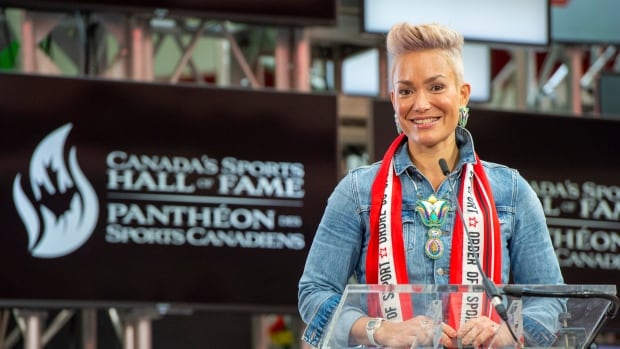WARNING: This article contains details of sexual and other physical abuse and suicidal thought.
A former Olympic athlete with a history of fighting against abuse in sport says she wants an inquiry into amateur sport in Canada to address systemic sexual, physical and verbal abuse of athletes.
Waneek Horn-Miller is the former co-captain of Canada’s Olympic women’s water polo team. She was removed from the team in 2003 over what Water Polo Canada claimed were “team cohesion” issues. She said Canada’s amateur athletes need help.
“We cannot rely on current competing athletes to fight within their sports. You can’t, because that means the end of their career. And that is why I have been so vocal as a retired athlete to do something about it,” Horn-Miller — the first Mohawk woman from Canada to compete in the Olympics — told a parliamentary committee of MPs on Monday.
“I would like an inquiry, but we can’t have another inquiry that has no teeth. We have to do something.”
Horn-Miller first rose to national attention during the Oka Crisis when, aged 14, she was stabbed in the chest by a soldier’s bayonet while holding her four-year-old sister.
Horn-Miller, who now coaches water polo, joined Water Polo Canada’s diversity task force in June of 2020 to help the organization’s efforts to fight systemic racism in sport.
In announcing Horn-Miller’s appointment, Water Polo Canada issued a public apology to her, acknowledging that she was compelled to leave the team before the end of her athletic career.
“We sincerely apologize to her, and others who we have hurt and excluded,” the statement read. “We are reaching out to our current and retired athletes to hear their stories so we can learn from them.”
WATCH: Olympian says athletes can’t be made responsible for fighting abuse in sport:
In her testimony before the standing committee on the status of women, Olympic water polo player Waneek Horn-Miller discusses her role as a retired athlete and her recommendations for the committee.
Horn-Miller told the committee that in the wake of Oka, water polo became her “suicide preventer … stress reliever.
“It became much more important to me as my life kind of spun out of control in the political sense. I became more focused on my Olympic dreams.”
She said that, like many other athletes, she let the goal of getting to the Olympics and winning a medal convince her to accept racial and verbal abuse she would not otherwise have tolerated.
“It was well known the abuse that took place, that the coaches held the power. The rumours that existed were of sexual abuse, verbal abuse, abuse of power all the time,” she said.
Horn-Miller said that she was told by the former captain of the team that she should brace herself for the abuse to come. She said she struggled with the atmosphere at first but remained “laser focused” on getting to the Olympics.
“You have a dream of becoming an Olympian and you are extraordinarily vulnerable. The power is held within the coach’s hand. You will do anything, anything to get your Olympic dream. It is an obsession that makes you vulnerable to all kinds of abuse,” she said.
WATCH: Elite athletes are “basically employees” of federal government: An Olympian discusses Sport Canada
Speaking before the standing committee on the status of women, Olympic water polo player Waneek Horn-Miller says elite athletes don’t get enough protection from the federal department.
After she failed to medal at the Sydney 2000 Olympics, Horn-Miller said, the abuse within the organization increased and she made a complaint.
Sport Canada and Water Polo Canada brought in York University to investigate, which found that abuse that was not sexual in nature had taken place. Coaches were fired and a new regime was brought in.
Shortly after that report was published, Horn-Miller was removed from the team. She told MPs Monday that she felt she had been labelled “the problem Native.”
“I realized that there was no desire within Water Polo Canada to resolve our conflict, our issues, there was no resolution, there was no reconciliation after,” she said.
The next generation
In October, four former members of the national water polo team filed a $5.5-million lawsuit against Water Polo Canada.
In their statement of claim, which has not been tested in court, the former athletes alleged that several former coaches and staffers working for Water Polo Canada subjected athletes to physical, psychological and emotional abuse and sexual harassment.
One of the coaches mentioned in the statement of claim coached the women’s senior team from 1985 to 2001 but was removed from his post after complaints about verbal abuse.
The statement of claim says that same coach was rehired two years later before being removed from his position again in 2011.
WATCH: Horn-Miller addresses the rehiring of a coach she says she lost her ‘career trying to stop’
Olympian Waneek Horn-Miller testifies before the standing committee on the status of women.
“They rehired this coach. I lost my career trying to stop it,” Horn-Miller told MPs, becoming visibly emotional.
“I was depressed and suicidal and I cannot tell you. If I wasn’t Native, and my community didn’t take me and say, ‘We love you, we honour you and we care for you,’ I don’t know what I would have done.
“I’m so angry that Sport Canada continued to fund an organization that went and rehired one of these coaches who continued to function without oversight, to ruin the lives of another generation of women. How can that happen?”
Support is available for anyone who has been sexually or physically abused.
If you or someone you know is struggling, here’s where to get help:





